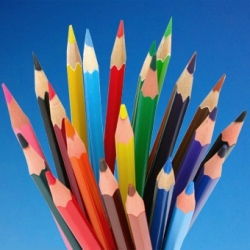
E Ink is proving itself to be a versatile technology, showing up not just in eReaders but in traffic signs, clocks, wall panels and even shoes. One thing the technology has always had trouble with is color. The workaround for a long time has been the use of color filter arrays (CFA), but the range and richness of those is limited.
Now a company has unveiled Advanced Color ePaper (ACeP), which it promises will bring the full color gamut to its screens. Basic E Ink screens are made up of microcapsules under the surface, which are filled with black and white pigments floating in a clear liquid. These pigments move to the foreground in various combinations of black and white, according to an electric charge they receive from underneath the capsule, which determines what appears on screen. Previously, to achieve color, a CFA was overlaid on the screen, which would reflect color back on an RGB scale.
With ACeP, E Ink has built the full color range into individual pixels, adding pigments of color into the capsules that previously only held black and white. That was more challenging than it sounds, considering the team needed a way to independently bring different colors to the surface of the screen.
E Ink hasn’t revealed the details on how it solved that problem, but did say many materials and waveform inventions had to be developed along the way. The result is a full color display that still reflects light in the same way as previous E Ink screens, making it readable in all lighting conditions.
Unfortunately, people waiting for full color eReader devices will be waiting a little bit longer. The first application for the ACeP displays will be in digital signage, an area that E Ink is clearly looking to expand upon, and with good reason: LCD billboards and signs are power-hungry and expensive to run, and E Ink is positioning itself as a cost-effective and energy-efficient alternative.
The demo units made so far are 20 inches (50.8 cm), with a resolution of 1,600 x 2,500 at 150 ppi. E Ink showed off its ACeP this week at the Display Week exhibition in San Francisco, where it won the Best In Show award.
